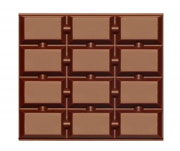






Kraft Foods SA became the first big South African business to achieve Fairtrade certification for its Cadbury Dairy Milk slabs, guaranteeing farmers a better price for cocoa, a basic ingredient of chocolate.
The Ghanaian government has stepped up its rural development efforts and now supplies basic amenities such as potable water, solar devices, access to schools, healthcare and housing.
"Those who remain in the communities are not looked down upon anymore. Those who return are no longer seen as drop-outs. There is money to be made. If you do farming you are better off. You can see that in the lifestyle, they (farmers) are able to afford all the electronic gadgets you can think of," says cocoa farmer Michael Awusi Ampah.
After Côte d'Ivoire, Ghana is the second-largest cocoa producer in the world. Its cocoa industry accounts for 3.4% of the country's gross domestic product and directly and indirectly employs 2 million people. Only about 30% of the total volume produced is processed locally by companies such as Cargill and Barry Callebeaut, with the rest exported as raw beans.
Cadbury has operated in Ghana since 1908, when it first set up a warehouse to source high-quality beans.
Cadbury's MD in Ghana, James Boateng, says the company wants to double its business in two years.
"It is possible because, at a macro level, we are operating in a boom. Our category is growing, there is peace and stability in the country and there is a lot of investment going on."
For its South African chocolate confections, Kraft Foods exports cocoa butter and cocoa liquor from the Ports of Tema and Takoradi to Port Elizabeth where its biggest local brands, such as Dairy Milk, Top Deck, Wholenut and Lunch Bar are manufactured.
With the growing shift in consumers' social consciousness, companies are increasing the number of Fairtrade products on their shelves.
The Fairtrade Mark was established in the early 1990s. About 7,5 million people across 60 developing countries benefit from the international authentication system.
But the human cost of the world's most popular confection is high.
The 2010 film, The Dark Side of Chocolate, by Miki Mistrati and U Roberto Romano exposed forced labour practices, human trafficking, and child slavery in West Africa where children as young as seven work illegally in plantations.
The irony is that most of these children cannot afford to buy chocolate and most of them will never know what it tastes like.
Yaa Peprah Amekudzi, programme director of the Cadbury Cocoa Partnership (CCP), said that in Ghana, children were usually only involved during specific periods of the harvest, during the fermenting and drying processes.
For sceptics wondering what a company's monetary benefit is for seeking Fairtrade certification, Amekudzi simply says: "A sustainable cocoa supply chain keeps us in business. No cocoa, no chocolate."
Fairtrade certification guarantees that cocoa producers receive at least $2000, or the world price, whichever is higher, per ton of cocoa beans.
Producers also receive $200 a ton for compulsory investment in economic, social or environmental projects that benefit their communities.
But the high price for Ghanaian cocoa has also created an incentive for smuggling.
It is believed that an average of 100000 tons of beans are smuggled into Ghana each year.
Before launching the CCP in 2008, Cadbury commissioned a study at the University of Sussex in the UK, which showed that the Ghanaian farming population was ageing. "The programme came into effect at the right time. The lack of social amenities and the manual nature of the cocoa industry made it totally unattractive. Farmers were advising their children to get out of the farms and go to the city. People were losing interest in the industry," Boateng says.
Life in the rural areas is easier because of better living and working conditions, he says, and the generations-old father-to-son legacy of cocoa farming appears to be in no danger of dying out.
Life certainly seems idyllic in the rural Mpaem community, where a frail elder sits fiddling with a radio as he watches over his small cassava patch. I offer him a slightly melted wrapped chocolate bar. He asks what it is. I say that is chocolate. Somewhat puzzled, he answers: "Oh."
South African consumers snack on 14-million plain Dairy Milk chocolate bars every year - that is more than 4000 every day.
Source: Business Day

For more than two decades, I-Net Bridge has been one of South Africa’s preferred electronic providers of innovative solutions, data of the highest calibre, reliable platforms and excellent supporting systems. Our products include workstations, web applications and data feeds packaged with in-depth news and powerful analytical tools empowering clients to make meaningful decisions.
We pride ourselves on our wide variety of in-house skills, encompassing multiple platforms and applications. These skills enable us to not only function as a first class facility, but also design, implement and support all our client needs at a level that confirms I-Net Bridge a leader in its field.
Go to: http://www.inet.co.za